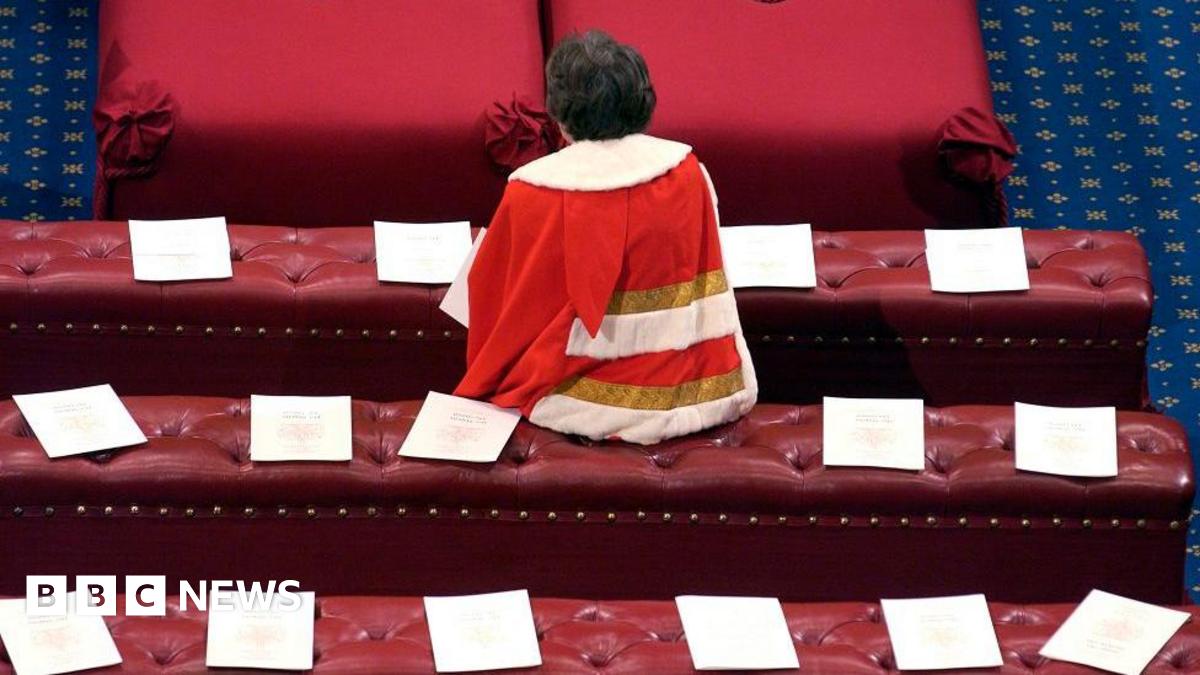Facing Extinction: The Future Of Hereditary Peers In Britain

Welcome to your ultimate source for breaking news, trending updates, and in-depth stories from around the world. Whether it's politics, technology, entertainment, sports, or lifestyle, we bring you real-time updates that keep you informed and ahead of the curve.
Our team works tirelessly to ensure you never miss a moment. From the latest developments in global events to the most talked-about topics on social media, our news platform is designed to deliver accurate and timely information, all in one place.
Stay in the know and join thousands of readers who trust us for reliable, up-to-date content. Explore our expertly curated articles and dive deeper into the stories that matter to you. Visit Best Website now and be part of the conversation. Don't miss out on the headlines that shape our world!
Table of Contents
Facing Extinction: The Future of Hereditary Peers in Britain
The House of Lords, the second chamber of the UK Parliament, remains a unique institution globally, a blend of appointed life peers and hereditary peers inherited through lineage. But the future of hereditary peers in Britain is increasingly uncertain, prompting questions about tradition, democracy, and the very fabric of the UK's political landscape. This isn't just a historical curiosity; it's a debate with significant implications for the future of British governance.
The Decline of Hereditary Privilege
For centuries, hereditary peerages granted titles and seats in the House of Lords, often associated with significant land ownership and influence. However, the role and influence of hereditary peers have significantly diminished over the years. The House of Lords Act 1999 drastically reduced their numbers, removing the vast majority of hereditary peers from the chamber. While a small number remain, their voting power is significantly curtailed.
This reduction reflects a broader societal shift away from inherited privilege and towards a more meritocratic system. The arguments for reform center on the principles of fairness and democratic representation. Critics argue that inherited titles are undemocratic, bestowing power based on birthright rather than merit or popular mandate. The current system, they contend, lacks legitimacy in a modern democratic society.
The Arguments for Preservation
Despite the criticisms, arguments persist for retaining a limited presence of hereditary peers. Proponents emphasize the historical continuity they represent, arguing that their experience and knowledge provide valuable perspectives within the legislative process. They point to the institutional memory and long-term vision that hereditary peers can offer, contrasting this with the potentially short-sighted perspectives of elected officials with shorter terms.
Furthermore, some argue that a complete removal of hereditary peers would be a drastic break from tradition, potentially undermining the UK's unique constitutional history. The debate, therefore, isn't simply about numbers; it's about the fundamental principles of British governance and the balance between tradition and modern democratic ideals.
The Path Forward: Reform or Abolition?
The future of hereditary peers in Britain remains uncertain. Several paths are possible:
- Gradual phasing out: A gradual reduction in the number of hereditary peers over time, possibly through attrition and non-replacement.
- Complete abolition: The complete removal of hereditary peers from the House of Lords, resulting in a fully appointed chamber.
- Limited role: Maintaining a small, symbolic number of hereditary peers with minimal or no voting rights.
Each option carries its own set of consequences. A complete abolition could be seen as a radical break with tradition, while a gradual phasing out might prolong an already debated system. Maintaining a symbolic presence might appease some while failing to address underlying concerns about democratic legitimacy.
The Broader Implications
The debate about hereditary peers touches upon larger questions regarding the future of the House of Lords itself. Discussions around its composition, powers, and role within the UK's parliamentary system are ongoing. Reform of the upper chamber remains a topic of considerable political debate, with various proposals being discussed to improve its effectiveness and enhance its democratic legitimacy. The fate of hereditary peers is inextricably linked to these broader conversations.
The future of hereditary peers in Britain is far from settled. The coming years will likely witness further debate and potential legislative action, shaping not just the composition of the House of Lords but also the broader understanding of privilege, tradition, and democracy in the UK. This is a story to follow closely, as it unfolds within the ever-evolving political landscape of Britain.

Thank you for visiting our website, your trusted source for the latest updates and in-depth coverage on Facing Extinction: The Future Of Hereditary Peers In Britain. We're committed to keeping you informed with timely and accurate information to meet your curiosity and needs.
If you have any questions, suggestions, or feedback, we'd love to hear from you. Your insights are valuable to us and help us improve to serve you better. Feel free to reach out through our contact page.
Don't forget to bookmark our website and check back regularly for the latest headlines and trending topics. See you next time, and thank you for being part of our growing community!
Featured Posts
-
 New Research Probes Santorini Volcano For Eruption Prediction
Apr 22, 2025
New Research Probes Santorini Volcano For Eruption Prediction
Apr 22, 2025 -
 Political Crisis Deepens Pms Silence On Ruling And Spying Claims Under Scrutiny
Apr 22, 2025
Political Crisis Deepens Pms Silence On Ruling And Spying Claims Under Scrutiny
Apr 22, 2025 -
 Spy Allegations And Court Decision Public Demands Prime Ministerial Response
Apr 22, 2025
Spy Allegations And Court Decision Public Demands Prime Ministerial Response
Apr 22, 2025 -
 El Salvadors Deal With Venezuela A Prisoner Exchange Involving Deportation
Apr 22, 2025
El Salvadors Deal With Venezuela A Prisoner Exchange Involving Deportation
Apr 22, 2025 -
 Mens Healthcare Understanding The Gender Gap In Gp Appointments
Apr 22, 2025
Mens Healthcare Understanding The Gender Gap In Gp Appointments
Apr 22, 2025
